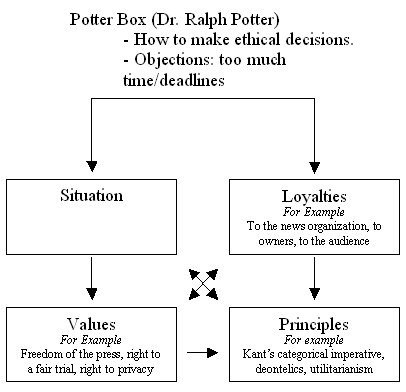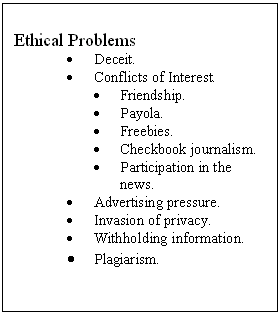3. Situation Ethics
-
Based on the situation (It all depends.)
·
Antinomianism
·
John
Merrill’s Deontelics
·
Mixed-Rule
Deontolgoy
·
Love
of Neighbor
·
Utilitarianism
·
Ayn
Rand’s Rational Self-Interest
·
John
Rawl’s Veil of Ignorance
·
Aristotle’s
Golden Mean


Journalism Ethics- Chapter 22
Introduction to Ethics
Definition by
Conrad C. Fink, professor of Media Ethics, "Ethics is a system of
principles, a morality or code of conduct. It is the values and rules of life
recognized by an individual, group or culture seeking guidelines to human conduct
and what is good or bad, right or wrong."
Many professions
have mandatory codes of ethics.
- Examples: Doctors, Lawyers, and
Accountants
- If they violate their code of ethics they
may lose the right to practice.
Journalism as a
profession has been slow to enforce a code of ethics because:
- There is a fear of infringing upon the
first amendment- freedom of the press.
- It is difficult to determine exactly who
is a journalist.
News organizations
and associations have established codes of conduct on their own, but they are
usually very vague and broad.
- Critics condemn codes of ethics for being
too general and ineffective or toorestrictive.
- Even if your organization doesn’t have a
code of ethics you should devise yourown ethical values and principles.
Three ethical philosophies are derived
from the answer to the question, "Does theend justify the means?"
If the answer is
no: You are an absolutist and subscribe to deontological ethics.
- Deontology is the ethics of duty, or the
person’s duty to do what is right.
- The absolutist journalist is concerned
only with whether an event is newsworthy. -The duty of a journalist is to
report the news. Period. Journalists are unethical onlywhen they withhold the
news.
If the answer is
yes: You are a relativist and subscribe to teleological ethics.
- Teleological ethics holds that what makes
an act ethical is not the act itself butthe consequences of the act.
- The end can and often does justify the
means, so the rules can sometimes be bent.
- The intention of the person performing the
act determines if it is ethical orunethical.
If the answer is
maybe or sometimes: You would subscribe to situation ethics.
- Situation ethics is the belief that the
answer all depends upon the situation.
Here are some examples
of different types of theories on situation ethics.
- Antinomianism is the belief that
there are no laws and every person and everyethical situation is unique.
- John Merrill’s Deontelics is a
combination of deontological andteleological ethics- One must consider both the
act and the consequences of the act.
- Mixed-Rule Deontology is to follow
certain guidelines are set that make someacts, usually considered unethical,
ethical in certain situations.
- Love of Neighbor is based on the Golden Rule and the maxim, "You
shall loveyour neighbor as yourself." Therefore always place people first.
- Utilitarianism is the belief that
your choices are ethical if you alwayschoose the action that is likely to bring
the most happiness to the greatest number ofpeople.
- Ayn Rand’s Rational Self-Interest
is the opposite of utilitarianism. Her"Ethical Egoism" holds that one
would never sacrifice one’s self for thegood of others but would always act
entirely on what best serves one’s self. Whateverhelps you get good stories and
thus advance in the profession is ethical.
- John Rawls’ Veil of Ignorance would
have you treat all people the same,as if there is no difference in social or
economic status. People would be more likely tolook out for themselves if they
placed themselves in the position of others.
- Aristotle’s Golden Mean states that
the best moral position is usually amoderate one that avoids either of two
extremes. It doesn’t need to be squarely inthe middle, but if you avoid extremes
you are more likely to find a rational and moralposition.
Solving Ethical Dilemmas
There is usually
not one clear answer to a difficult ethical dilemma, but Principled
Reasoning makes ethical decision making possible, by reflecting on ethical
principles that will help you decide proper or moral ways to act.
To help in this
reasoning is a model of moral reasoning called the Potter Box.
- Apprising the situation. You need all the facts from a variety of sources.
- Identifying values. What are your
personal, news organization’s,community’s and nation’s values?
- Appealing to ethical principles. To be ethical you may have to choose theprinciple
that doesn’t serve your personal interest.
- Choosing loyalties. You must find a
balance in which you can be loyal to yournews organization, your readers,
listeners, or viewers, and also your sources and those onwhom you are
reporting.
This is a
continuing ethical dialogue that will help you create ethical journalism, and
after using it all the time you will know your values and which principles to
apply. Journalism should be done by people who make informed, intelligent and
prudent choices.
Ethical Problems Protecting the First
Amendment
Using Deceit to get a story.
- "Journalists demean themselves and
damage their credibility when theymisrepresent themselves and their work to
news sources and, in turn, to the public atlarge."- Everette E. Dennis,
Executive Director of The Freedom Forum Media StudiesCenter
Conflicts of
Interest.
- Friendship can be the greatest obstacle to
the flow of information. Sometimesreporters get too close to their sources.
- Payola- News organizations frown upon
reporters doing promotional work for peoplethey cover.
- Freebies- Can reporter remain objective?
Do reporters write stories they wouldotherwise not write? Does the public
perceive the reporter who has accepted or issuspected of accepting freebies as
objective?
- Checkbook journalism- Good reporting would
demand that you pay sources only whennecessary and only if you can get other
sources to corroborate your findings. Your bossesalso better know you are doing
it.
- Participation in the news. Is it okay to
belong to different organizations as long asyou let your readers know?
Invasion of
Privacy, such as reporting on crime
victims or juvenile crimes.
Withholding
Information. If you work as a
journalist are you ever off duty?
Plagiarism. Give credit where credit is due.
Three Final Guidelines:
Be free of
obligations to anyone or to any interest except the truth.
Be fair.
Remember good
taste!

